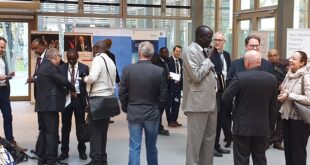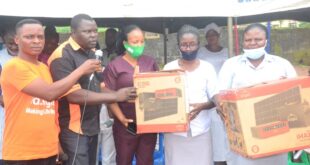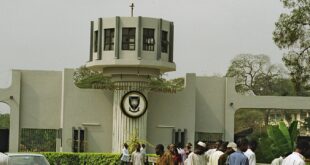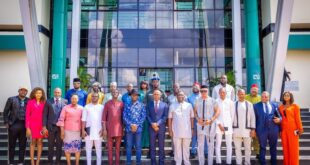Germany seeks a partnership for a common future with Africa, Chancellor Angela Merkel said at the opening of the G20 Africa Conference in Berlin. She encouraged the participants to an open, purposeful discussion: “Talk openly, we have to learn from each other and we have to achieve results.”
“I hope that this conference will help us take responsibility together,” Chancellor Angela Merkel stressed in her opening speech at the 2-day conference “G20 Africa Partnership: Investing in a Common Future” in Berlin on Monday.
Many African countries are already strong political and economic partners of the G20 countries. With the conference, which is taking place within the context of Germany’s G20 Presidency (from 1 December 2016 to 30 November 2017), the world’s leading economic powers want to explore new opportunities for sustainable economic growth, investment and stability in Africa. The German chancellor had invited the heads of state and government of African partner countries to a high-level dialogue in Berlin.

Seeking new investments for Africa
The Berlin conference focuses on new investment opportunities on the African continent and it is based on two documents published at the beginning of 2017. These are the so-called “Marshall Plan with Africa”, developed by the German Ministry of Development and Economic Co-operation, and the “Compact with Africa”, prepared jointly by the German Ministry of Finance, the World Bank, the African Development Bank and the International Monetary Fund.
The G20 and African partners want to agree on new incentives for more private investment, investment in public infrastructure and economic participation through employment in Africa. Germany envisages that increased investment in the continent will foster conditions that will encourage Africans to remain at home, thereby mitigating the migration crisis in Europe.
A single state could do little, the German chancellor emphasized in her speech: “We must create a sustainable, inclusive economic development for the entire world,” she said. Globalisation was not a fate to which one had to submit. It needs partnership-based approaches, Merkel added. With Agenda 2030, something great has already been achieved because all the countries of the world have agreed on a common development path, the chancellor said.
Each country should bring in its development needs and indicate how and where it can be supported, Merkel told an audience including nine African leaders from Egypt, Guinea, Ghana, the Ivory Coast, Mali, Niger, Rwanda, Senegal and Tunisia. “We want to provide improved instruments, we want to support the regional integration of the markets so as to strengthen technology and knowledge transfer, and we also want to align the trade flows between Europe and African countries so that this is mutually beneficial,” said Merkel. There is still much to be done here, she noted.

Development through security
Development is only possible if security is ensured, the Chancellor continued. Security is not sufficiently ensured in many African countries, she noted. Fragile states, terrorism and humanitarian crises made development difficult. In many countries the issue of economic dynamism is not the priority. The question of daily survival has the greatest priority, she added.
Chancellor Merkel made it clear: “The partnership with Africa is about economic development, but also about promoting peace, stability and security.” One had to create the basic conditions for economic activities to take place at all.
“We also have to learn to think anew,” Merkel said. Security issues have not played a role in development policy in the past. “We have to be honest with ourselves and say: only where security is guaranteed can development take place at all.” The Chancellor expressly praised states that were ready to take their fates into their own hands.
Africa’s youth is the future
Special attention should be paid to the African youth, Merkel said. The average age in many African countries is 15 years. “If we do not give the youth a perspective, if we do not invest in education and training, if we do not strengthen the role of young girls and women, the development agency will not succeed,” Merkel said.
“Within the framework of our G20 initiative ‘Compacts with Africa’, we will try to improve the prerequisites so that Africa can develop the necessary dynamism that we need,” Merkel said.

New perspectives through cooperation
“If there is too much hopelessness in Africa, there are, of course, young people who say we can have a life somewhere else in the world,” said Merkel. The German government therefore wants to create perspectives for young people in Africa so that fewer people are going to flee. The states must work together to put a stop to the smugglers’ business, the chancellor warned.
In a subsequent panel discussion, the heads of state and government of the African partner countries exchanged views on the framework conditions for trade and investment opportunities in Africa.
After a bilateral meeting with Egyptian President Abdelfattah Al-Sisi at the Chancellery, the Chancellor met the President of Guinea who is also the African Union chair, President Alpha Condé, as well as Moussa Faki, the President of the African Union Commission. Topics of the trilateral discussion were the extensive co-operation with the African Union as well as the joint implementation of the G20 Africa partnership.
Femi Awoniyi
About the G20 Africa Partnership
The international conference “G20 Africa Partnership – Investing in a Common Future”, taking place on 12 and 13 June at the EUREF campus in Berlin, is intended to contribute to enhanced co-operation between the G20 and African states. The focus of the G20 Africa Initiative is discussed in dialogue formats with political decision-makers as well as civil society and business representatives. The aim of the conference is to convey a modern, differentiated African image and to attract private investors for a stronger engagement in Africa.
The G20 is comprised of 19 countries, the world’s most powerful economies, plus the EU. The countries are Argentina, Australia, Brazil, Canada, China, France, Germany, India, Indonesia, Italy, Japan, Mexico, Russia, Saudi Arabia, South Africa, Republic of Korea, Turkey, the UK and the US.
The conference is one of the activities of the Germany’s current presidency of the G20, which has placed Africa at the top of its priorities. Organizers are the Federal Ministry of Finance, the Federal Ministry for Economic Cooperation and Development and the German Central Bank.
 THE AFRICAN COURIER. Reporting Africa and its Diaspora! The African Courier is an international magazine published in Germany to report on Africa and the Diaspora African experience. The first issue of the bimonthly magazine appeared on the newsstands on 15 February 1998. The African Courier is a communication forum for European-African political, economic and cultural exchanges, and a voice for Africa in Europe.
THE AFRICAN COURIER. Reporting Africa and its Diaspora! The African Courier is an international magazine published in Germany to report on Africa and the Diaspora African experience. The first issue of the bimonthly magazine appeared on the newsstands on 15 February 1998. The African Courier is a communication forum for European-African political, economic and cultural exchanges, and a voice for Africa in Europe.























